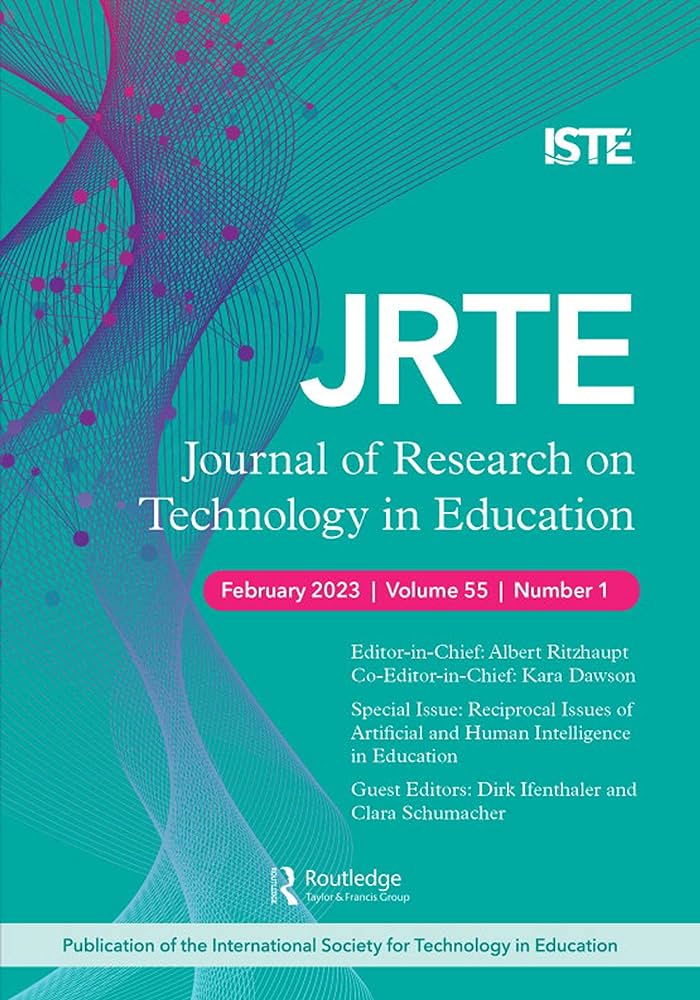Reciprocal issues of artificial and human intelligence in education
IF 5
2区 教育学
Q1 Social Sciences
Journal of Research on Technology in Education
Pub Date : 2023-01-03
DOI:10.1080/15391523.2022.2154511
引用次数: 2
Abstract
With the emerging opportunities of artificial intelligence (AI), learning and teaching may be supported in situ and in real time for more efficient and valid solutions. Hence, AI has the potential to further revolutionize the integration of human and artificial intelligence and impact human and machine collaboration in learning and teaching (De Laat et al., 2020). The discourse around the utilization of AI in education shifted from being narrowly focused on automation-based tasks to augmentation of human capabilities linked to learning and teaching (Chatti et al., 2020). In this regard, in reciprocal interaction, tasks can be distributed between humans and the AI (Molenaar, 2022). As such, AI systems can analyze large datasets, including unstructured data, in real time, and can detect patterns or structures that can be used for intelligent human decision making in learning and teaching situations (Ifenthaler, 2015). For instance, recommender systems are designed to support learners in areas where the amount of data exceeds the individual’s abilities to process it and provide them with the most relevant, interesting, or useful artifacts (Verbert et al., 2012). Conventional methods, such as collaborative filtering or content-based recommender systems, assume that learners with similar preferences would favor the same things (Hemmler et al., 2022). Examples of successful adaptation include finding relevant learning content (Deschênes, 2020), entire courses (Guruge et al., 2021), or the optimal sequence of learning content and activities (Kerres & Buntins, 2020). Due to the remaining challenges of implementing meaningful AI in educational contexts, especially for more sophisticated tasks, the reciprocal collaboration of humans and AI might be a suitable approach for enhancing the capacities of both (Baker, 2016). However, understanding how AI, as a stakeholder among humans, selects and acquires data in the process of learning and knowledge creation, learns to process and forget information, and learns to share knowledge with collaborators is yet to be empirically investigated. This special issue brings together scholarly research and theory focusing on contemporary issues related to artificial and human intelligence in education and how they support students in educational settings. The contributions provide insights into how educational practice in various contexts can be augmented between AI and human stakeholders. Accordingly, this rich collection of articles critically reflects on the reciprocal issues of artificial and human intelligence in education.人工智能和人类智能在教育中的相互作用
随着人工智能(AI)的出现,学习和教学可能会得到现场和实时的支持,以获得更有效和有效的解决方案。因此,人工智能有可能进一步彻底改变人类和人工智能的融合,并影响人类和机器在学习和教学中的协作(De Laat et al., 2020)。围绕人工智能在教育中的应用的讨论从狭隘地关注基于自动化的任务转向增强与学习和教学相关的人类能力(Chatti et al., 2020)。在这方面,在互惠互动中,任务可以在人类和人工智能之间分配(Molenaar, 2022)。因此,人工智能系统可以实时分析大型数据集,包括非结构化数据,并可以检测可用于学习和教学情境中智能人类决策的模式或结构(Ifenthaler, 2015)。例如,推荐系统的设计目的是在数据量超过个人处理能力的领域为学习者提供支持,并为他们提供最相关、最有趣或最有用的工件(Verbert et al., 2012)。传统的方法,如协同过滤或基于内容的推荐系统,假设具有相似偏好的学习者会倾向于相同的事物(Hemmler等人,2022)。成功适应的例子包括找到相关的学习内容(Deschênes, 2020),完整的课程(Guruge等,2021),或学习内容和活动的最佳顺序(Kerres & Buntins, 2020)。由于在教育环境中实施有意义的人工智能仍然存在挑战,特别是对于更复杂的任务,人类和人工智能的互惠合作可能是提高两者能力的合适方法(Baker, 2016)。然而,人工智能作为人类的利益相关者,如何在学习和知识创造的过程中选择和获取数据,如何学会处理和忘记信息,如何学会与合作者共享知识,还有待实证研究。这期特刊汇集了学术研究和理论,重点关注与人工智能和人类智能在教育中的当代问题,以及它们如何在教育环境中支持学生。这些贡献提供了如何在人工智能和人类利益相关者之间增强各种背景下的教育实践的见解。因此,这个丰富的文章集合批判性地反映了教育中人工智能和人类智能的相互问题。
本文章由计算机程序翻译,如有差异,请以英文原文为准。
求助全文
约1分钟内获得全文
求助全文
来源期刊

Journal of Research on Technology in Education
EDUCATION & EDUCATIONAL RESEARCH-
CiteScore
11.70
自引率
5.90%
发文量
43
期刊介绍:
The Journal of Research on Technology in Education (JRTE) is a premier source for high-quality, peer-reviewed research that defines the state of the art, and future horizons, of teaching and learning with technology. The terms "education" and "technology" are broadly defined. Education is inclusive of formal educational environments ranging from PK-12 to higher education, and informal learning environments, such as museums, community centers, and after-school programs. Technology refers to both software and hardware innovations, and more broadly, the application of technological processes to education.
 求助内容:
求助内容: 应助结果提醒方式:
应助结果提醒方式:


